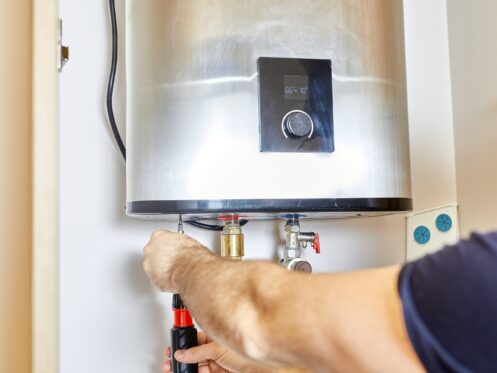Tankless water heaters are among the hottest trends in home improvement. While the technology isn’t new, it has become much more refined and compelling over the years. Let’s explore the top benefits for your household if you make the switch as well.
Virtually Limitless Hot Water Supply
A key selling point for tankless water heaters is never running out of hot water. The average home with a traditional water heater has a 40 to 60-gallon tank. If your usage spikes on a given day and you use all your hot water, you’re out until the system recovers. That can take an hour or more if you have an older water heater.
You certainly can overtax an on-demand water heater. Even then, you’ll experience low water pressure, but you won’t simply run out. The system can also immediately recover once you turn off the appliances or fixtures taxing it.
The Option to Size Beyond Daily Need
Tankless water heaters are inherently more efficient because they don’t use energy to maintain water temperature. A traditional water heater, on the other hand, stores and heats water to meet your eventual need. Sizing a tank accurately is critical for this reason. If you purchase a 75-gallon tank rather than the 50-gallon you need, you’ll pay for it daily. That isn’t the case with on-demand water heaters. You can opt for a much higher flow rate than you usually require. Doing so can make a big difference when hosting parties or family visits.
Flexible Installation
It’s generally not practical to have more than one storage-based water heater. You’ll size the tank to your total needs and supply the entire home from it. That’s an option with tankless water heaters as well but not the only one. If you have a large house, for instance, it may be more efficient to serve it with two or more smaller systems. Having multiple units also opens up the option of installing point-of-use (POU) water heaters. POU water heaters are ideal for showers and home additions. You can also strategically install recirculating pumps and compact storage tanks as needed.
Less Risk of Water Damage
Another notable advantage of tankless water heaters is that they’re safer overall. The average water heater tank can dump dozens of gallons of water onto your floor in no time at all. That level of flooding can cause substantial water damage. Water damage like that is highly uncommon with tankless systems. While they can leak, it’s generally tantamount to a dripping faucet. They’re also unlikely to explode due to gas line and venting safety mechanisms. While not common, tank water heaters have the potential to explode simply due to a buildup of pressure in the tank.
Smaller Installation Footprint
Tank water heaters take up much more space, which can be considerable if you need a 75-gallon tank or bigger. Many homes have dedicated water heater closets because of it. Even if you opt for a tall, thin model for the garage, it will still occupy a significant area. Tankless water heaters take up little space in comparison and only need about 6 to 12 inches of clearance. Many people opt to install them out of sight, such as in the attic. If you have a water heater closet, you can repurpose it. With POU units, you can install them in compartments that you build into the wall.
Reduced Household Carbon Footprint
Water heating is among the leading uses of energy in most U.S. households. While tank water heaters consume energy heating stored water, tankless water heaters don’t. They only use energy when you’re running a fixture or appliance. How much of a difference that makes depends on how much hot water you use. For the average household, which uses 41 gallons of hot water or less daily, it’s between 24% and 34%. If your household uses 86 gallons or more, which is a lot, the energy savings will still be between 8% and 14%.
Lower Water-Heating Costs
The Department of Energy estimates that water heating accounts for nearly 20% of the average household’s annual energy costs. Many households can save over $10 a month with a tankless water heater. While that may not seem like a lot, it adds up. That’s over $120 a year and nearly $2,000 over the life of the typical tank water heater.
Extended Replacement Timeline
Another nice aspect of an on-demand water heater is that you won’t have to worry about replacing it as often. The average tank water heater lasts between eight and 12 years. Tankless water heaters have an average lifespan of about 20 years. Achieving that longer lifespan is easier with an on-demand model as well. Traditional water heaters may only last six to eight years if you’re not regularly flushing the tank and replacing the anode rod.
Decreased Total Cost of Ownership
Tankless water heaters are more expensive up front. The equipment costs more as does the initial installation involving the conversion. Subsequent installations are about the same or even cost less. You’ll pay less for your tankless water heater month to month. Your tankless water heater will last around twice as long and perhaps more, which makes a big difference. There are also more energy incentives available for the more efficient systems, and they tend to be bigger as well.
Less Maintenance
On-demand water heaters require a lot less maintenance. Tank water heaters require annual maintenance, and in some areas, you may need two appointments a year. Tankless water heaters can often go three to five years between service appointments. They may need descaling then and otherwise just require filter replacements, which the homeowner can usually handle. Storage-based water heaters require regular flushing and anode rod replacement. There are also valves that can go bad while on-demand systems have few components that you have to check regularly.
Longer and More Robust Warranty Coverage
Another reason to choose a tankless water heater is the warranty protection. The typical tank water heater warranty is good for about six years. Tankless water heater warranties last twice as long on average. There are even manufacturers that offer 25-year warranties, which is unheard of with tank models. The base coverage tends to be more robust, and there are more extended warranty options. That’s because there are simply fewer parts that can fail with an on-demand system.
Improved Property Value
The real estate industry estimates that a tankless water heater increases home value by about 1.2%. It’s also a selling point. If you lease the property, it will be more appealing to potential renters. If you’re selling, buyers will see it as long-term savings. After all, they don’t have to worry about upgrading the electrical panel and plumbing system.
Tankless Water Heater Installation in Colorado Springs
Alphalete Plumbing Drain Heating & Air is a plumbing contractor based in Colorado Springs, CO. Our licensed plumbers provide residential and commercial plumbing services throughout the region. We are proud to partner with the top brands but install all water heaters to warranty specifications.
Our company offers free in-person consultations and quotes for replacements and new installations. We often have specials available and offer flexible financing options subject to credit approval. Call today or contact us online with questions and to set up your appointment.


